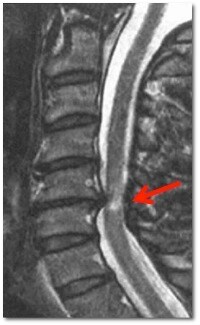Spinal Cord Compression
Cervical myelopathy is a syndrome of difficulty walking, hand clumsiness, arm weakness, and/or numbness/tingling caused by compression of the spinal cord. The spinal cord can become compressed by narrowing of the spinal canal (cervical stenosis), disc herniations, and/or bone spurs. The symptoms of cervical myelopathy can be similar to the symptoms of peripheral neuropathy, cubital tunnel syndrome, or carpal tunnel syndrome. If untreated, the symptoms of cervical myelopathy tend to progress over time.
Causes
Degenerative changes such as disc herniations and bone spurs can narrow the spinal canal and constrict the spinal cord. Patients who are born with a narrower spinal canal to begin with are more likely to develop spinal cord compression.
Symptoms
- Neck pain and stiffness
- Difficulty walking, loss of balance
- Hand clumsiness (difficulty with buttons, handwriting
- Arm and hand weakness, numbness
- Leg stiffness
Treatment
Surgery is often necessary to decompress or relieve the pressure on the spinal cord.